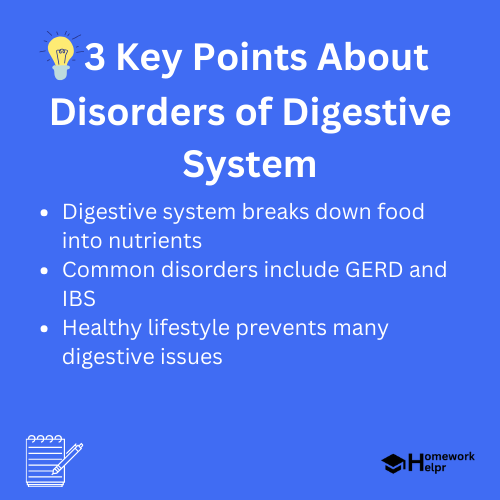📝 Summary
Disorders of the digestive system can significantly impact health by disrupting the important process of breaking down food into essential nutrients. Key organs such as the mouth, esophagus, stomach, small and large intestines, liver, gallbladder, and pancreas work together to ensure proper digestion. Common disorders include GERD, ulcers, irritable bowel syndrome (IBS), inflammatory bowel disease (IBD), and constipation. Causes often involve poor diet, stress, infections, and medications. Symptoms like abdominal pain, nausea, changes in bowel habits, and unexplained weight loss should be monitored. Treatment options vary but include dietary changes, medications, therapy, and sometimes surgery. Maintaining a healthy lifestyle can also assist in preventing these disorders.
Disorders of Digestive System
The digestive system is one of the most essential systems in our body, responsible for breaking down food into nutrients. These nutrients are then absorbed into the bloodstream to nourish our cells. However, various disorders can disrupt this complex process, leading to significant health issues. Understanding these disorders is crucial for maintaining good health.
What is the Digestive System?
The digestive system consists of a series of organs that work together to process food. Key components include the mouth, esophagus, stomach, intestines (small and large), liver, gallbladder, and pancreas. Each organ plays a specific role in digestion:
- Mouth: Chews food and mixes it with saliva.
- Esophagus: Transports food to the stomach.
- Stomach: Churns food and mixes it with digestive acids.
- Small Intestine: Absorbs nutrients from digested food.
- Large Intestine: Reabsorbs water and processes waste.
By functioning together seamlessly, these organs ensure that our bodies receive the necessary energy and nutrients from food.
Definition
Nutrients: Substances that provide nourishment essential for growth and the maintenance of life. Absorption: The process by which substances are taken in by the body, especially through the intestines.
Common Disorders of the Digestive System
Various disorders can arise in the digestive system, each with its own causes and symptoms. Here are some of the most common:
- Gastroesophageal Reflux Disease (GERD): This condition occurs when stomach acid flows back into the esophagus, resulting in heartburn, regurgitation, and difficulty swallowing.
- Ulcers: Open sores on the lining of the stomach or small intestines. They can cause pain, nausea, and indigestion.
- Irritable Bowel Syndrome (IBS): A disorder characterized by abdominal pain, bloating, and changes in bowel habits.
- Inflammatory Bowel Disease (IBD): Chronic inflammation of the digestive tract, which can lead to severe symptoms and complications.
- Constipation: Difficulty in passing stools, often accompanied by abdominal discomfort.
💡Did You Know?
Did you know that the human digestive system is around 30 feet long? This includes the mouth, esophagus, stomach, small intestine, and large intestine!
Causes of Digestive Disorders
Understanding the causes of digestive disorders can help in early detection and treatment. Some common causes include:
- Poor diet: High-fat, low-fiber diets can lead to various digestive issues.
- Stress: Emotional stress can exacerbate symptoms of digestive disorders.
- Infections: Bacterial or viral infections can cause inflammation in the digestive tract.
- Medications: Certain medications can upset the digestive system, causing side effects like nausea or constipation.
Example
For instance, a diet rich in processed foods and low in fruits and vegetables can lead to constipation and other gastrointestinal disorders.
Symptoms to Watch Out For
Being aware of the symptoms associated with digestive disorders allows for prompt medical attention. Common symptoms include:
- Abdominal pain: Often a primary symptom of many disorders.
- Nausea or vomiting: Can indicate an underlying issue.
- Changes in bowel habits: This includes diarrhea, constipation, or altered stool appearance.
- Unexplained weight loss: Can signal serious digestive health concerns.
Definition
Gastroesophageal: Relating to the stomach and esophagus. Inflammation: The body’s response to injury or infection, often causing redness, swelling, and pain.
Treatment Options for Digestive Disorders
Treatment varies depending on the specific disorder but typically includes:
- Dietary changes: Increasing fiber intake and avoiding trigger foods.
- Medications: Antacids, anti-inflammatories, and digestive aids.
- Therapy and counseling: Particularly for conditions exacerbated by stress, like IBS.
- Surgery: In severe cases, surgical intervention may be necessary, such as for ulcers or IBD.
Example
For example, a patient diagnosed with GERD may be prescribed medications to reduce stomach acid and advised to avoid spicy foods.
Prevention of Digestive Disorders
While some disorders cannot be prevented, many can be managed or avoided through healthy lifestyle choices. Consider these preventive measures:
- Balanced diet: Incorporating plenty of fruits, vegetables, and whole grains.
- Regular exercise: Enhancing overall gut health and promoting digestion.
- Managing stress: Techniques such as meditation, yoga, or deep breathing exercises can be helpful.
- Staying hydrated: Drinking enough water aids in digestion and prevents constipation.
Definition
Antacids: Medications that neutralize stomach acidity to relieve heartburn and acid indigestion. Trigger foods: Foods that can provoke or worsen the symptoms of a digestive disorder.
Conclusion
Understanding the disorders of the digestive system is vital for maintaining good health. From recognizing symptoms to implementing preventive strategies, being informed empowers us to take charge of our digestive health. Regular check-ups with a healthcare provider, combined with a healthy lifestyle, can contribute to healthier digestion and an overall well-being. Be vigilant and proactive about your digestive system, as it significantly impacts your quality of life.

Related Questions on Disorders of Digestive System
What are the common disorders of the digestive system?
Answer: Common disorders include GERD, ulcers, IBS, IBD, and constipation.
What causes digestive disorders?
Answer: Common causes are poor diet, stress, infections, and certain medications.
What symptoms should I watch for regarding digestive health?
Answer: Look out for abdominal pain, nausea, changes in bowel habits, and unexplained weight loss.
How can digestive disorders be treated?
Answer: Treatment options may include dietary changes, medications, therapy, and, in some cases, surgery.
